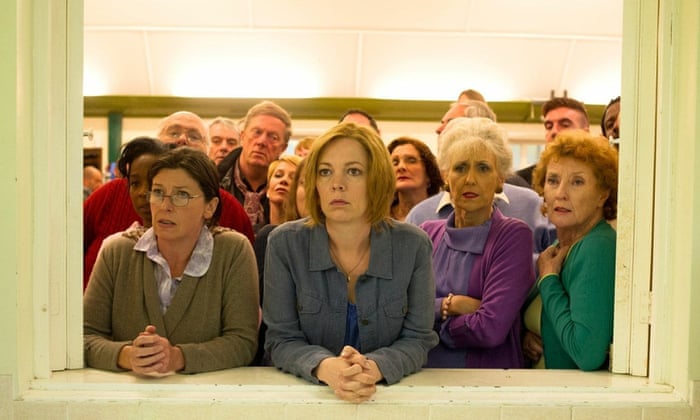"London Road" – A Hauntingly Unique Exploration of Community and Tragedy
London Road, directed by Rufus Norris and released in 2015, stands as one of the most unconventional and striking films in British cinema. Based on the National Theatre’s acclaimed stage production, the film adapts real-life interviews into a sung-through musical that dramatizes the 2006 Ipswich serial murders and the community’s response. With a powerful ensemble cast led by Olivia Colman, Tom Hardy, and Anita Dobson, London Road blurs the line between documentary and performance, crafting an unsettling yet deeply human portrait of resilience, fear, and transformation.
The film centers on the residents of London Road, a quiet suburban street in Ipswich that found itself at the heart of national media attention when five women were murdered in a matter of weeks. The police investigation eventually led to the arrest of Steve Wright, a local man living on the very same street. But London Road does not sensationalize the crimes or focus on the killer; instead, it turns its gaze inward — toward the neighbors, shopkeepers, and ordinary citizens who were forced to confront the horror and reclaim their sense of safety and identity.

What makes London Road so remarkable is its form. The dialogue — taken verbatim from interviews conducted by writer Alecky Blythe — is delivered through music composed by Adam Cork. Every stutter, repetition, and awkward pause is preserved and set to melody, creating a rhythmic, hypnotic experience. Rather than traditional show tunes, the songs reflect the cadences of real speech, lending an eerie authenticity to the film. This technique forces the audience to hear the characters in a way that is simultaneously raw, intimate, and disorienting.
At its core, London Road is a story about how communities respond to trauma. Initially, the residents express shock, fear, and suspicion. As the investigation unfolds, paranoia spreads, and everyday routines become charged with dread. But gradually, the community begins to heal — organizing garden competitions, neighborhood meetings, and support groups to rebuild a shared sense of belonging. The film captures this emotional arc with sensitivity, refusing to offer easy answers or tidy resolutions.

Olivia Colman delivers a standout performance as Julie, a concerned resident who becomes a quiet leader in the local recovery effort. Her portrayal is grounded and compassionate, conveying the complex mix of anxiety and hope that defines the film’s tone. Tom Hardy makes a brief but memorable appearance as a taxi driver obsessed with the details of the investigation — a chilling commentary on society’s fascination with crime.
Visually, London Road is atmospheric and restrained. Cinematographer Danny Cohen captures the drab, rainy landscape of Ipswich in muted tones, reinforcing the sense of unease and disconnection. Yet there are also moments of strange beauty — flowerbeds blooming, children playing, and people coming together in a shared humanity.
In the end, London Road is not an easy watch, but it is a necessary one. It challenges the conventions of musical theater, crime drama, and documentary alike. Through its innovative style and deep empathy, it offers a powerful meditation on fear, community, and the fragile, persistent will to move forward after tragedy.


